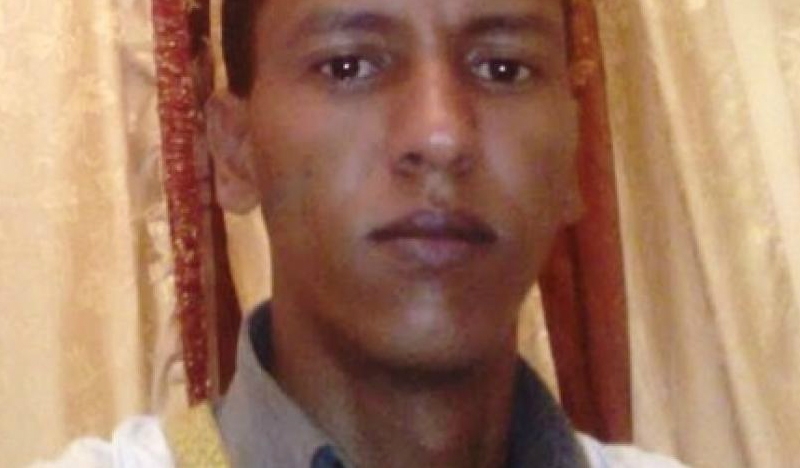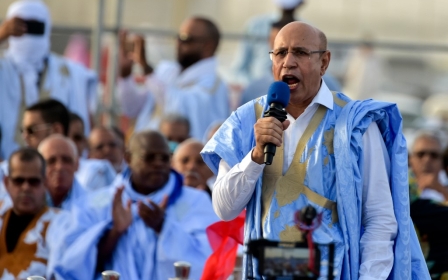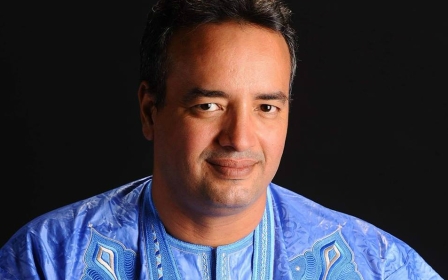Mauritania releases 'blasphemy' blogger jailed since 2014

Mauritania has released a blogger who drew international attention after being accused of blasphemy, his lawyer and the campaign group Reporters Without Borders (RSF) said Tuesday.
Cheikh Ould Mohamed Ould Mkheitir, 36, had been initially sentenced to death but was then given a jail term on appeal.
He remained in detention despite having already served the sentence, sparking a chorus of protests from rights groups and an appeal for his release from US Vice President Mike Pence earlier this month.
Mkheitir "is no longer in Nouakchott," the Mauritanian capital, his lawyer Fatimata Mbaye told the AFP news agency.
"[He] was released yesterday from the place where he was under house arrest... [but] is not completely free in his movements," said Mbaye without elaborating.
New MEE newsletter: Jerusalem Dispatch
Sign up to get the latest insights and analysis on Israel-Palestine, alongside Turkey Unpacked and other MEE newsletters
Mkheitir's release came in the final days of the presidency of Mohamed Ould Abdel Aziz, who had previously argued that to free Mkheitir would endanger the blogger as well as the public.
When contacted by the media watchdog RSF after his release, Mkhaitir thanked all the organisations who have been campaigning on his behalf ever since his arrest in January 2014
'Security grounds'
Mkheitir was sentenced to death for blasphemy in December 2014 after he wrote a blog that challenged decisions taken by the Prophet Mohammed and his companions during holy wars in the seventh century.
He repented after being given that sentence, prompting an appeal court in November 2017 to downgrade the punishment to a two-year jail term.
Mkheitir's lawyers said he should have been released immediately, having already spent four years behind bars, but remained confined.
Many demonstrations calling for his execution had been held during his trial and the authorities continued to detain him on “security grounds,” denying him access to his family and lawyers.
Mauritania's legal system is based on a mix of French civil law and Islamic law.
Last year, the country passed a mandatory death penalty law for anyone found guilty of "blasphemous speech" and acts deemed "sacrilegious".
Previously, Article 306 of the country's penal code allowed a death sentence to be commuted to life in prison should a convicted person show remorse for apostasy-related crimes.
'Preparing national opinion'
On 20 June, Abdel Aziz defended Mkheitir's continued detention, saying it was justified by "his personal security as well as the country's," the AFP news agency reported.
"We know that from the point of the view of the law, he should be freed, but for security reasons, we cannot place the life of more than four million Mauritanians at risk," he said.
In an open letter published the following day, 10 rights groups, including RSF, called on Abdel Aziz to use his final weeks in office to end the "illegal detention".
Abdel Aziz and religious leaders then launched a process of "preparing national opinion" for Mkheitir's release, under which he formally repented again, on social media.
On Thursday, Abdel Aziz hands over the presidency to Mohamed Ould Cheikh Ghazouani, a former general and close ally, after serving a maximum two terms in office.
Ghazouani won presidential elections on 22 June with 52 percent of the vote, according to official figures disputed by the opposition.
Middle East Eye delivers independent and unrivalled coverage and analysis of the Middle East, North Africa and beyond. To learn more about republishing this content and the associated fees, please fill out this form. More about MEE can be found here.





